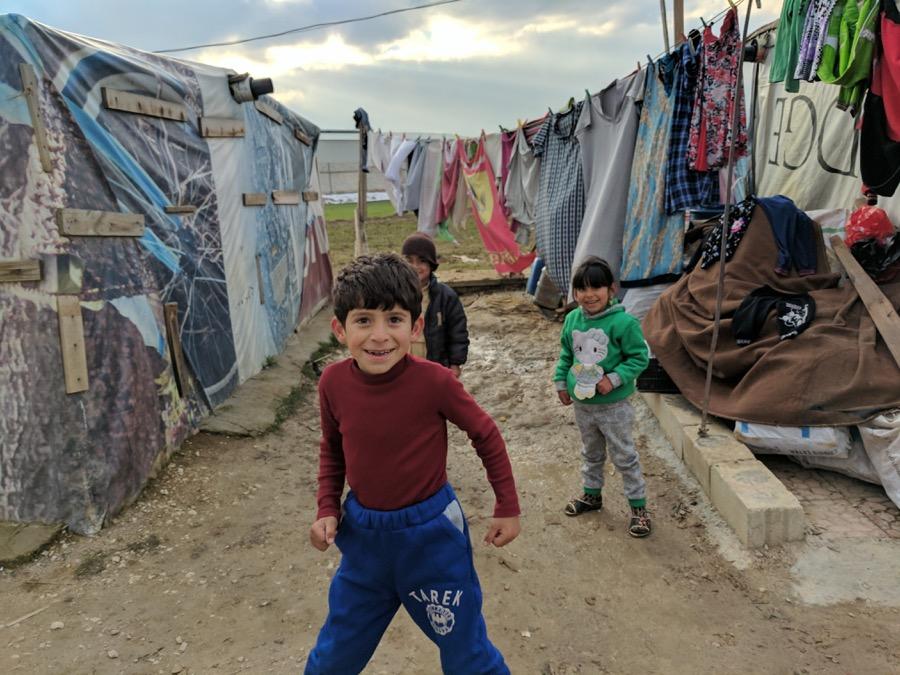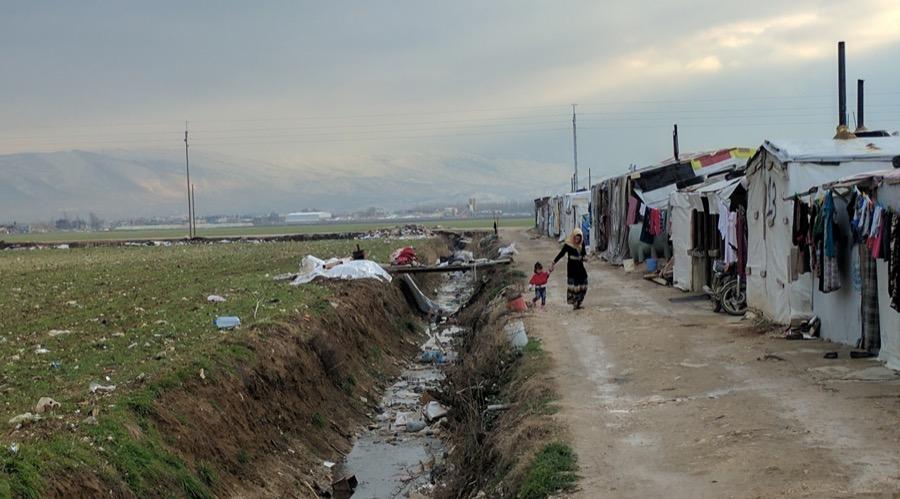After Trump’s ban, Lebanon renews calls to send back Syrian refugees
Over a million Syrians have fled to neighboring Lebanon and set up shelters like these, in Bekaa Valley, in the eastern part of the country.
In the wake of Donald Trump’s executive order banning entry of Syrian refugees to the US, there are signs that the walls are closing in on the war-stricken nationals elsewhere too.
Lebanon is home to some 1.5 million Syrians who fled the war next door. They make up about a fourth of the host country’s population. It is the highest concentration of refugees in the world, and Lebanon’s often held up as an example of how the international community should welcome refugees.
But there’s been a steady alignment of views between Lebanon’s president and Trump regarding the refugee crisis, as the Syrian conflict nears its sixth year. The new US migration restrictions have reinvigorated the discussion over the fate of refugees in Lebanon.
Just a few days after Trump’s order, Lebanese President Michel Aoun renewed calls for Syrians to be repatriated to their home country. Like Trump, he cites security fears, among other reasons. He also backs the idea of creating safe zones in Syria for refugees to return home — a policy apparently supported by Trump.
A US federal judge has temporarily lifted America’s refugee ban. And it’s unclear how or when Lebanon might act on Christian leader Aoun’s proposals. But both leaders’ intended policies are creating more uncertainty for exiles of a country witnessing the deadliest war of the 21st century.
Syrians hoping to head to the US have found chaos in airports around the world. And in the unofficial camps of eastern Lebanon, where thousands of Syrians live in makeshift shelters of plastic and wood, the leaders’ statements seem to come from another world.
Akkar, a 39-year-old mother of nine from the Syrian city of Homs, lives with her family in a roughly 15-by-15-foot tent alongside an open field in Lebanon’s Bekaa Valley. She asked only for her first name to be used.
There are few places worse for refugees than the one Akkar has found herself. Shelters like this are temporary and poorly built. Official refugee camps are forbidden by the Lebanese government, and so these settlements are the only option for the poorest Syrians.
“It changes the way I think about America,” she says from inside her tent, when asked about her view of the US refugee ban. “Refugees are the world’s poorest people, and they need help and protection.”
“Canada, France — all these countries are trying to help refugees and protect them, trying to help them find a better life, America is not going to accept them?”
One issue with Syrians staying in Lebanon long term is that some locals fear they will settle here indefinitely — as Palestinians did in successive waves in 1948 and 1967, when tens of thousands were forced from their homes and others fled in the Arab-Israeli wars. Their stay was meant to be temporary, but today some 500,000 are still here. Their presence was a spark that set off the Lebanese civil war, which lasted from 1975-1990.
Power in Lebanon is divided among its largest sects — Christians (including Maronites, Protestants and Greek Orthodox), Shiite Muslims and Sunni Muslims. When it was conceived in 1943, this system was based on the premise that there was almost an equal balance of Christians and Muslims in the country. Over the years, Lebanon’s Christian population has declined (rough estimates suggest around 1.7 million, although no census has been conducted since 1932).
Many Christians fear the more than a million mostly Sunni Syrians will stay in Lebanon, upsetting the delicate sectarian balance and weakening their power.
As the leader of Lebanon’s largest Christian party, Aoun has long warned of such an occurrence. In 2015, he accused the international community of “throwing the refugee burden on Lebanon,” and said Lebanon cannot bear the economic and security burden they place on the country.
One of the ironies of the crisis is that many of the neediest Syrian refugees — those in temporary shelters like the Bekaa camp — are often the ones who are keenest to return to Syria.
“Life is very hard here, especially in winter. You have to find diesel for the heater, and you have to find food. You have to fix your shelter. We are borrowing money every day,” Akkar says. “As long as I am in Lebanon, I cannot see my future. The best thing for my family is to go back to my country.”
Related: 'I would prefer to live in Syria with the bombs than in conditions like this'
Trump says he intends to order the Pentagon to draw up plans for safe zones — areas that would be monitored and protected by US aircraft, likely in agreement with Russia. The idea has been knocked back by the United Nations’ commissioner for refugees, Filippo Grandi.
“Frankly, I don’t see in Syria the conditions” for safe zones, Grandi told reporters in Beirut last week. “With the fragmentation, the number of actors, the presence of terrorist groups, it’s not the right place to think of that solution.”

While these discussions take place, thousands wait in the cold and damp, bearing the brunt of the Lebanese winter.
But the ban has cast its shadow on Syrians regardless of their class. Many are caught between Trump’s ban and Aoun’s desire for Syrians to return home.
Marina, a 30-year-old caterer from the Syrian city of Aleppo, had been trying for more than a year to get to the US with her Lebanese husband before Trump announced an indefinite suspension on Syrian refugee admissions on Jan. 27. Although it’s now in limbo, the executive order has caused disruption for thousands around the world. Marina’s husband was granted a visa, but she has been struggling to wade through the bureaucracy of the asylum process.
“With the new election, I feel any process will be virtually impossible. At least for this coming few years,” she says. Marina also asked for her last name not to be used, so as not to jeopardize any future applications.
Marina hoped to open a restaurant in the US with some friends who already resettled there.
“I thought that might be a good way to bring people together. That is America to me. That’s why it’s called the United States,” she says.
Those dreams have now been put on hold. Being a Syrian refugee in Lebanon, she says, “is like trying to give the best of you, with nothing in return. There is no protection for us.”
Related: Lebanon doesn't want Syrian refugees getting too comfortable, even in winter
Up until 2015, Lebanon had an open-border policy with Syria that allowed its citizens to enter the country with little trouble. Lebanon imposed new restrictions in January of that year, including a $200 fee for a permit that lasts six to 12 months and documentation proving the purpose of their visit.
The parallels between Aoun and Trump only go so far. The Lebanese leader says he does not endorse sending Syrians back while the situation in Syria is dangerous.
But even the creation of safe zones raises a dilemma, says Maha Yahya, director of the Carnegie Middle East Center in Beirut, and a Lebanese national.
“We lived in a war where there were areas with no fighting,” she says in reference to Lebanon’s civil war, “but we knew very well that it could erupt at any time.”
Yahya says that Lebanon is unlikely to start returning Syrians any time soon because the refugees’ presence hasn’t affected the political balance in Lebanon so far. And also for other reasons, practical and political.
“Syrian refugees are scattered across Lebanon and they are not really in clearly demarcated camps,” she says.
“On top of which you will have the human rights aspect. I don’t think they would risk the uproar that would erupt from this.”
But although the US and Lebanon face different challenges, Aoun and Trump are finding some common ground, at least for now.
“Does Trump’s position have support among Aoun supporters? Big time. Will there be a meeting of the minds on these positions, very possibly,” Yahya says.
“They are both very populist leaders, so while they agree on the need to ban refugees, they each have their own reasons and logic.”
Richard Hall reported in Bekaa Valley, eastern Lebanon.
